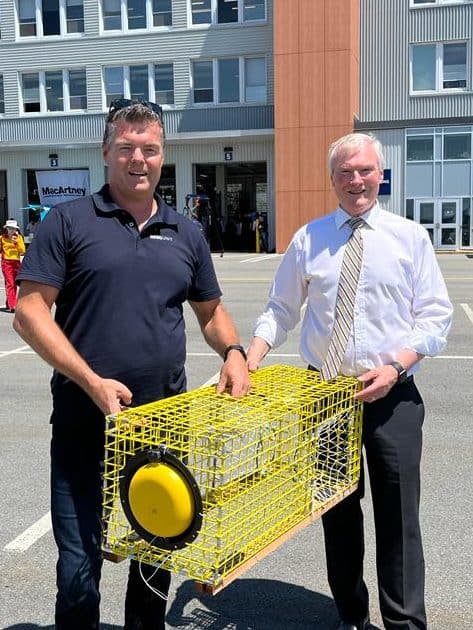Is the Ghost Gear Crisis finally on the political agenda?
As the political climate is coming to life after the summer hibernation, the topics are returning to the agenda one after another. Before the summer, a historically important plastics agreement was concluded in Nairobi during the UN’s fifth environmental assembly. WWF calls this a turning point in the fight against plastic pollution.
Norway, as one of the world’s major fishery nations, is painfully aware that fishing gear makes up by far the largest share of plastic that ends up in the sea. Not as visible, perhaps, as straws and empty bottles lying on our shores, but far more harmful and with far-reaching consequences.
Fishing gear that is left on the bottom of the sea is not only a giant plastic pollutant, but also continues to fish and kill animals in endless cycles called ghost fishing.
In WWF’s report “STOP GHOST GEAR”, it is estimated in parts of the world that up to 30% of the decline in some fish stocks can be attributed to ghost fishing. It is estimated that fish and shellfish with a commercial value of as much as US$16 billion are lost to ghost fishing every year.
Two birds with one stone
If you want to reduce plastic litter in the sea, you must attack the problem where it is greatest. Over 70% of the macroplastic that ends up in the sea is fishing gear.
We at Resqunit have now developed and are selling a product that prevents the loss of fishing equipment and ensures that both the fishing equipment and the valuable catch end up with the rightful owner.
With the entire sales budget for 2022 already in order backlog, we are now focusing on production and the delivery to Canada as well as several smaller deliveries in other countries. We are also working towards an agreement for European distribution of our products.
(The article continues below the image)

As authorities internationally show increased action against ghost fishing, Norway is criticized for not taking measures for the fishing and aquaculture industry immediately, now most recently in Arendalsuka during the debate “Roadmap to a global plastic agreement”
In the company Resqunit, we notice a changing tide in the willingness, and almost desperation, to do something. As we are following our strategy with sales activities and work towards fisheries authorities in selected countries, we are on weekly basis contacted by fisheries authorities worldwide who want more information and testing of our products.
Since we started the company in 2018, we believe to have contributed to a gradual maturing of the willingness to act around these issues, and so far in 2022 it has almost exploded, and it only seems to continue.
Norwegian version
Er «The Ghost Gear Crisis» endelig på den politiske agendaen?
Nå som det politiske klimaet våkner til live etter sommerdvalen, kommer temaene tilbake på dagsorden på rekke og rad. Før sommeren ble det inngått en historisk viktig plastavtale i Nairobi under FNs femte miljøforsamling. WWF kaller dette et vendepunkt i kampen mot plastforurensning.
Norge, som en av verdens store fiskerinasjoner er smertelig klar over at fiskeutstyr utgjør den desidert største andelen av plast som ender opp i havet. Ikke like synlig, kanskje, som sugerør og tomflasker som ligger i fjæresteinene, men langt skadeligere og med vidstrakte konsekvenser.
Fiskeutstyr som blir liggende på havets bunn er nemlig ikke bare en gigantisk plastforsøpler, men fortsetter også å fiske og drepe dyr i uendelige sykluser kalt spøkelsesfiske.
I WWFs rapport «STOP GHOST GEAR» anslås det i deler av verden at inntil 30% av nedgangen i fiskebestandene skyldes nettopp spøkelsesfiske. Det anslås at fisk og skalldyr med kommersiell verdi på så mye som 16 milliarder dollar går tapt i spøkelsesfiske hvert år.
To fluer i en smekk
Ønsker man å redusere plastforsøplingen i havet, må man angripe problemet der det er størst. Over 70% av makroplasten som ender opp i havet er fiskeutstyr.
Vi i Resqunit har nå utviklet og selger et produkt som forhindrer tap av fiskeutstyr, og sørger for at både fiskeutstyret og fangsten ender opp hos den rettmessige eieren.
Med hele salgsbudsjettet for 2022 allerede i ordrereserve, fokuserer vi nå på produksjon og leveransen til Canada samt flere mindre leveranser i flere nasjoner. Vi jobber oss også nærmere en avtale for europeisk distribusjon for våre produkter.
Samtidig som myndigheter internasjonalt viser økt handlekraft mot spøkelsesfiske, kritiseres Norge for ikke å iverksette tiltak for fiske- og havbruksnæringen umiddelbart, nå senest i Arendalsuka under debatten «Veikart til global plastavtale»
I selskapet Resqunit merker vi en tydelig endring i villigheten, ja nærmest desperasjonen, til å gjøre noe. Samtidig som vi følger vår egen strategi med salgsaktiviteter og arbeid inn mot fiskerimyndigheter i utvalgte land, kontaktes vi nå nærmest ukentlig av fiskerimyndigheter verden over som ønsker mer informasjon og utprøving av produktene våre.
Siden vi startet selskapet i 2018 mener vi selv å ha bidratt til en gradvis modning i handlingsvilje rundt disse problemstillingene, og så langt i 2022 har det nærmest eksplodert, og det ser bare ut til å fortsette.